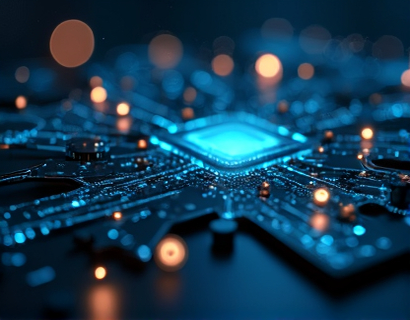AI-Powered Adaptive Learning: Unlocking Personalized Education for Students and Lifelong Learners
In the rapidly evolving landscape of education, the integration of Artificial Intelligence (AI) has opened new avenues for personalized learning experiences. Adaptive learning platforms powered by AI are revolutionizing the way students and lifelong learners access and engage with educational content. These platforms leverage advanced algorithms and machine learning techniques to deliver tailored educational experiences that cater to individual learning styles, needs, and goals.
The core principle behind AI-powered adaptive learning is to create a dynamic and responsive educational environment. Unlike traditional teaching methods that follow a one-size-fits-all approach, adaptive learning systems continuously assess a learner's performance and adjust the content in real-time. This ensures that each student receives the most appropriate material at the right level of difficulty, fostering an optimal learning experience.
One of the key benefits of AI-driven adaptive learning is the ability to provide instant feedback. Traditional classrooms often struggle to offer immediate and personalized feedback, which can lead to misunderstandings and gaps in knowledge. With AI, learners receive instant corrections and explanations, allowing them to correct mistakes on the spot and reinforce their understanding. This immediate feedback loop is crucial for reinforcing learning and building confidence.
Adaptive learning platforms also create a supportive environment that encourages learners to explore and engage with the material at their own pace. The technology behind these platforms can identify areas where a student may be struggling and adapt the content to provide additional support. For instance, if a learner is having difficulty with a particular concept, the system can offer supplementary resources, such as videos, interactive simulations, or detailed explanations, to help solidify the understanding.
The personalization extends beyond just the content delivery. AI adaptive learning systems can also consider a learner's preferences and learning style. Some individuals may prefer visual learning, while others might benefit more from auditory or kinesthetic methods. By analyzing a learner's interactions and performance, the system can tailor the presentation of content to align with their preferred learning style, making the educational experience more engaging and effective.
For students, the advantages of AI-powered adaptive learning are manifold. First and foremost, it enhances the learning experience by making it more relevant and engaging. Learners are more likely to stay motivated and committed when the material is presented in a way that resonates with them. Additionally, the personalized approach helps in identifying and addressing knowledge gaps early on, preventing them from becoming significant barriers to learning. This proactive approach ensures that students can progress smoothly and achieve their academic goals more efficiently.
Lifelong learners, who may not be bound by the constraints of a traditional educational schedule, also benefit greatly from adaptive learning platforms. These individuals often have diverse schedules and varying levels of prior knowledge, making it challenging to find a suitable learning path. AI-driven systems can accommodate these differences by offering flexible learning paths that adapt to the learner's availability and current level of understanding. This flexibility is particularly valuable for professionals who wish to upskill or reskill without disrupting their careers.
The technology behind AI adaptive learning is grounded in several key components. Machine learning algorithms play a central role in analyzing learner data and making real-time adjustments to the educational content. These algorithms can process vast amounts of data, including performance metrics, time spent on tasks, and interaction patterns, to create a comprehensive profile of the learner. Based on this profile, the system can predict the most effective learning paths and resources for each individual.
Another critical aspect is the use of natural language processing (NLP) to understand and respond to learner queries and feedback. NLP enables the system to interpret textual inputs, such as questions or comments, and provide relevant and accurate responses. This interaction not only enhances the user experience but also allows the system to continuously learn and improve over time.
To illustrate the practical application of AI adaptive learning, consider a scenario where a high school student is studying mathematics. The adaptive learning platform begins by assessing the student's current knowledge through a series of diagnostic tests. Based on the results, the system identifies areas where the student needs improvement, such as algebra or geometry. The platform then curates a personalized lesson plan that starts with foundational concepts and gradually introduces more complex topics.
As the student progresses, the system continuously monitors their performance and adjusts the difficulty level of the exercises accordingly. If the student excels in a particular area, the platform can introduce advanced problems to keep them challenged. Conversely, if the student struggles with a concept, the system provides additional explanations, examples, and practice problems to reinforce understanding. Throughout this process, the student receives instant feedback on their answers, helping them to learn from mistakes and build confidence.
The supportive environment created by AI adaptive learning extends beyond just academic content. The platforms often include features that foster a sense of community and collaboration. Learners can connect with peers who are working on similar topics, participate in discussion forums, and engage in group projects. This social aspect not only enhances the learning experience but also helps in developing important interpersonal skills.
For educators and instructors, AI adaptive learning offers valuable insights into student performance and learning patterns. The data generated by the system can be used to identify common areas of difficulty, allowing educators to refine their teaching strategies and provide targeted support. This data-driven approach enables a more personalized and effective teaching method, complementing the adaptive learning experience for students.
Moreover, AI adaptive learning platforms are designed to be scalable and accessible. They can accommodate a large number of learners simultaneously, making them ideal for both individual and institutional use. Schools, colleges, and corporate training programs can integrate these platforms into their existing curricula, enhancing the overall educational offering without the need for significant infrastructure changes.
The future of education is undoubtedly moving towards more personalized and adaptive learning experiences. As AI technology continues to advance, we can expect even more sophisticated and intuitive adaptive learning systems. These future developments may include enhanced virtual reality (VR) and augmented reality (AR) integrations, further immersing learners in interactive and realistic learning environments. The potential for AI to transform education is vast, promising a future where learning is not only more effective but also more enjoyable and accessible to all.
In conclusion, AI-powered adaptive learning represents a significant leap forward in personalized education. By providing instant feedback, supporting diverse learning styles, and creating a tailored learning environment, these platforms empower students and lifelong learners to reach their full potential. As the technology evolves, the impact on education will only continue to grow, paving the way for a more inclusive and effective learning landscape.










































